|
Don't miss out on this chance to win $300+ worth of SFF books and loot, including a copy of Traitor!
0 Comments
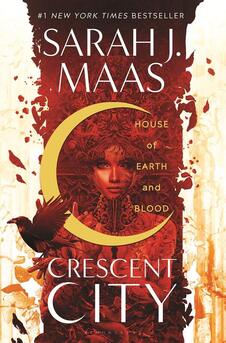 Took me long enough to get around to this one, but I have to say the size of this book was a bit daunting. I'm a fan of SJM (her ACOTAR series, at least) and really enjoyed her latest book A Court of Silver Flames so after a few somewhat lackluster reads in between, I decided I'd jump back to an author I knew I liked. After a brutal murder brings half-fae, half-human party girl Bryce Quinlan's life to a crashing halt, she retreats from the world and buries herself in work and social isolation. Two years later, an attack similar to the one that stole her best friend from her piques the interest of the city's most powerful immortals and Bryce is pressed into service to help track down the culprit. Hunt Athalar, the enslaved angel and infamous henchman of the city's governor Micah, is assigned to keep an eye on her while Bryce hunts for her friend's killer and the ancient fae artifact believed to be linked to the gruesome string of deaths. For the first quarter of this book, I was remarkably unimpressed. Lazy info-dump world building made the start of this one a total slog. I felt like the story could have started much later than it did, and a lot of the details about the various Houses could have been left out. It wasn't important to the book. The one-page reference at the start was enough to get the point across. I think Maas' editor did her a disservice in not pushing her to consolidate and clean up the beginning.
That being said, the slow start gradually picked up steam. By the halfway mark, I was having a great time. Bryce is sassy and clever, unexpectedly deadly, and the party-girl traits I disliked her for in the beginning evolve into far more grown-up dimensions of a delightfully complex main character. Hunt, too, has a well-molded backstory and unexpected depths that are gradually revealed over the course of the book. As far as steam level goes (SORT OF SPOILER, HERE), I was surprised at how tame this book turned out to be. There are a few 'softcore' moments, but compared to her other works, this was astonishingly PG-13. Maas' unabashed vocabulary makes an appearance or two, but she never actually delivers the goods. Maybe in the next book. In all, I ended up really enjoying this one, even if it had a bit of a rocky start. Strong themes of friendship, love, loyalty, and redemption are juxtaposed against difficult topics like misogyny, classism, and slavery. I think there's a lot of potential with this new series, and I look forward to seeing where SJM takes it. 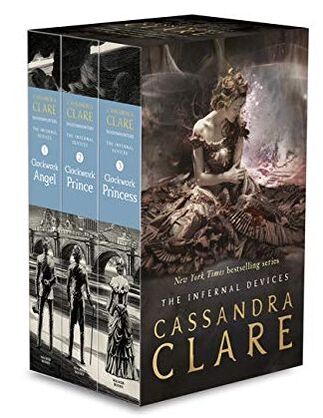 I wanted to try out Cassandra Clare's work and after a bit of back-and-forth with other bookish folks, I decided this would be a good place to start. The Infernal Devices is, as I understand it, a sort of prequel trilogy to the rest of her Shadowhunters series, which is quite extensive. This trio follows the tale of Tessa Gray, a young woman in pseudo-victorian London who is kidnapped and tortured by witches until she manifests a unique power: to shapeshift into anyone just by touching something of theirs, and gain access to their memories. Before she can be turned over to the 'big baddy' to have her powers exploited to evil ends, she is rescued and swept into the world of the shadowhunters, an enclave of supernatural warriors descended from angels who battle to keep the darker forces of the magical world in check. Through the course of the three books, Tessa helps her new companions track down the nefarious mastermind behind her kidnapping and stop his evil plot to take over the world. There is an undercurrent of 'found family' in this series that I really enjoyed. The Institute (the shadowhunters' London base) and its inhabitants form a unique blend of characters that each have their own distinct presence, and they play off each other wonderfully. Charlotte was probably my favorite character, though I really liked Magnus as well. Jem and Will were each charming in their own way, but I didn't get hugely attached to any of the three main characters. Romance is a big part of this trilogy, primarily the somewhat exhausting love triangle between Tessa, Jem, and Will. There's physical attraction and a few brief, semi-steamy moments but in all, it's appropriately tame to suit the victorian-era backdrop. I don't usually mind a love triangle, and this one wasn't awful, but I did get a bit fatigued with the back-and-forth and I'm not a big fan of polyamory (AKA the 'why choose' mentality that has been gaining popularity lately). Call me old-fashioned. I adored the minor romances, though. Sophie and Gideon stole my heart. On a technical level, this was a bit of hit-and-miss, in my opinion. The first book and most of the second were well-paced and reasonably plotted, but the third felt like it went off the rails for the entire middle half. The pace ground to a halt and the POV switches became disorienting. Then there's that really strangely-timed intimate scene... It eventually pulled back together to wrap up nicely, but that middle bit was a drag. Overall, the subplots felt a bit sparse and underwhelming, and didn't seem to add much to the story. Dialogue was reasonable, but prose felt stilted and flat and the constant literary references began to wear on me after a while. Having well-read characters is great, but don't base an entire relationship between two of them on a fictional work that only a small portion of your audience will have read. All-in-all, it was an intriguing premise and I found it entertaining, but I don't think I'll be picking up any more of Clare's work in the future. 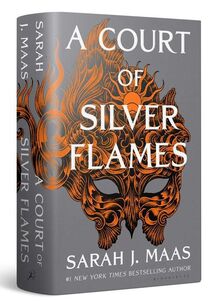 I'm such trash for this series. It's embarrassing. Despite what the publisher claims, the author herself declares these books are not intended for a young-adult audience and this particular installment demonstrates why. Not only is there a gratuitous amount of smut (thank you, SJM) but the theme itself is quite adult. Nesta faces an incredible uphill battle both internally and externally, and her struggle is heart-wrenching for anyone who has faced similar demons. ACOSF is significantly longer than its predecessor, A Court of Frost and Starlight, which was (if we're being honest) basically a filler novella. I imagine SJM was putting the majority of her efforts into Crescent City at the time, but wanted to keep this series alive. I'm glad she did. This behemoth is my new favorite in this series, and I hope she keeps writing these characters for many books to come. Nesta starts this one out at rock bottom. Excessive drinking, screwing strangers, and being thoroughly vicious to anyone who cares about her. Traumatized by her experience with the Cauldron and terrified of the power she stole from it, she has driven away her friends and her sisters, isolating herself to the utmost extent possible until finally Feyre and Rhysand draw the line. The crew holds a sort of intervention and sends Nesta off to the House of the Wind with Cassian to train, sober up, and generally get her shit together. Resistant at first, she slowly emerges from her torrent of self-destruction and gradually finds a way to live with herself after the horrors of the war with Hybern. The thing I think I enjoyed most about this book was the awful vibrancy of Nesta's guilt. It manifests as rage, as self-harm, as crushing loneliness and crippling fear. All the venomous inner thoughts, all the ways she lashes out at those trying to help her, are incredibly poignant for those who know that feeling firsthand. Those emotions can't be written by someone who hasn't felt them, who hasn't heard those voices in their head. For that alone, I hold a new respect for SJM. This book hit me on a level I didn't expect. 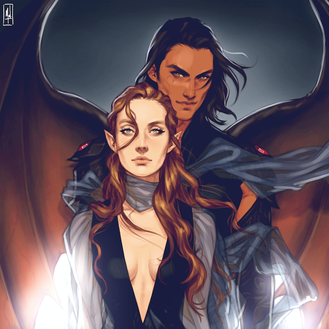 Art by Merwild Art by Merwild Close on its heels is, of course, the romance. SJM knows how to weave chemistry on the page. Shamelessly explicit in the best kind of way, this one surpasses its predecessors in steam level by a fair mark. Not for the shy or the faint of heart, certainly. In many books, this level of smut would come off as just panderingly pornographic, but it works in this world. SJMs variety of fae are inherently primal, and thus the graphic nature of their relationships is just an extension of that animal-like persona. They may have their art and their palaces and their magic, but they're a species that is ruled by their instincts. While the smut might be shocking, it doesn't feel out of place. I'll leave you with a nice bit of fanart by Merwild (click the pic to see more of her work on DeviantArt) and a final ruling: Two thumbs up on this one, SJM. You knocked it out of the park. I can't wait for the next installment. 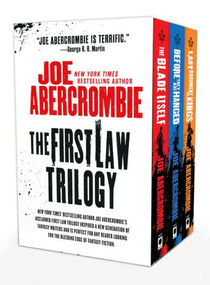 So I usually review books individually even if they're part of a series, but I'm making an exception this time. Between the Texas snowpocalypse 2021 and a number of other stress factors, I did not pause between books 2 and 3 to write my thoughts on Before They Are Hanged. Now, having finished Last Argument of Kings, I just don't have the stomach for it. That sounds bad. Maybe I should back up a second. Right now, you might be thinking something along the lines of, "but your review of The Blade Itself was so positive!" and yes, I loved that book. I loved Before They Are Hanged even more. And I really enjoyed most of Last Argument. Up until the end. It's a bit reassuring to discover that even a writer as renowned and as gifted as Joe Abercrombie can write a bad ending. His prose, his pacing, his characters are absolutely top-effing-notch and I bow my unworthy head in awe, but this one just left me angry, y'all. The let-down is all the worse because I liked these books so much. Chalk up another point to Abercrombie, I guess. He made me care enough to be mad about it. "Pump the brakes," you say? "I demand an explanation!" bellow the r/Fantasy wizards. Don't worry. I've had days of bitter reflection to put my thoughts together. Simply put, I wanted an....optimistic ending. Not a happy one, noooo no no, I knew perfectly well what kind of morally gray river I was diving into when I picked these up. That's half the reason I signed up for this ride. No, a happy ending would have been all wrong. But the one we got was so deliberately fatalistic, so over-the-top morose, that it almost becomes a caricature of itself. If you don't want spoilers, stop reading now. Aside from the small annoyances I had with Last Argument (like how the Bloody-Nine is never really explained or how the final battle sort of just petered out after a muddled and confusing climax), my main issue was the sudden abandonment of every single character arc in the books aside from Bayaz. This felt a lot like D&D's "subverting expectations" approach that ruined the Game of Thrones franchise. It was wholesale character assassination. It was Dani preaching "I'm not my father!" for seven seasons, and then burning King's Landing to the ground. The painstaking evolution of every character is just instantly disregarded and they all revert to their worst selves. Bayaz climbed his developmental mountain. Good-for-fucking-him. But Jezal, who had this inspiring journey of self-awareness and courage, reverts to a cowering sycophant. Both Logen and Glokta, who spend their arcs trying to be better men than they were, just shrug and toss those aspirations in the trash without even blinking. Ferro, whose journey opens her eyes to the realization that there's more to life than just revenge, runs off into the sunset to go slit Gurkish throats. The whole last fifth of the book is full of "oh well, I guess this is just what I am" moments. I wouldn't have minded if it was just one or two of the characters. I wouldn't have even minded the bad guy winning if some of the characters grew as a result of the journey. Maybe let Glokta's small measure of redemption with Ardee be a final turning point for him, causing him to shift the Inquisition toward something more closely resembling an institution of justice. Or leave Jezal quietly scheming to subvert Bayaz' control for the sake of his people. Leave West to live with the memory of his sins, a portrait of the gray state of man, proof that a few bad choices don't make us evil. Let Ferro and Logen have the misery of each other, or better yet give their lives to kill Bayaz. My mind spins with potential endings that I would have found more satisfying, but alas, this end is already written. I didn't want sunshine and rainbows, but... I mean... come on, Joe. FFS. Final thoughts: I recognize that this is a beloved trilogy to many, and I have immense respect for Abercrombie's skills, but I found the ending hugely disappointing. The journey was a fantastic one. I loved so many things about these books. I just wish there had been a glimmer of light at the end of the tunnel. 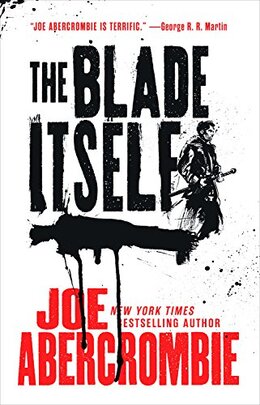 As a long-time member of the r/fantasy subreddit, I've seen the First Law trilogy recommended a thousand times for a hundred different reasons. It has long sat on my mental shelf labeled "should probably read that sometime to stay current with the genre" but didn't make it into my real-life TBR until this year. Even then, I had my hesitations. After all, hyped books are so often a disappointment and the big titles have let me down before. Looking at you, Name of the Wind. That being said, I was in the mood for some pro-level, grown-up fantasy after DNFing a poorly-written indie title that still makes me shake my head when I think about it, so I reached for this. "Go big or go home," I thought. And from the very first page, I was sunk. Let me start by saying that I didn't expect to like this book so much. I mean, I expected it would be pretty good, since it's so highly recommended, but I didn't think it would really meet my personal flavor given that there isn't much (hardly any) romance in it and almost all of the main characters are men. Plus, it's categorized as 'grimdark fantasy', which to me screams edgy, over-the-top, humans-are-terrible-the-world-is-terrible-why-do-we-even-try misery-fest. But...sigh... I really should read it...as a sort of author homework, if nothing else. I was wrong, friends. So very, very wrong. Abercrombie's tidy, forceful, expressive prose grabs you from the start and never stops delivering. He's eloquent when the situation calls for it, concise when it matters. There is a rhythm to his writing that makes the pages fly by effortlessly. I felt dusty parts of my vocabulary finally see the light of day after years of lying dormant, and yet the language never felt overwrought. He strikes a balance between necessity and flourish that few authors achieve, and as a writer, I found myself scratching at the pages in search of his secrets. Next are his characters, surely the strongest aspect of this book. How he can make me like a toothless, crippled, fatalistic master torturer with zero scruples is beyond logical explanation, but he does. There is nothing particularly likeable about Glokta, and yet he was one of my favorite characters. Another would be Logen, the war-weary, legendary swordsman with a dark reputation and an even darker secret. His chapters were full of fascinating inner thoughts that fleshed an incredibly complex character out of a tired fantasy stereotype. I could go on, but I think you get the picture. Last to touch on is plot, and while in hindsight nothing much seemed to happen in this book, I was never bored. Abercrombie doesn't rush, but he doesn't overstay his welcome either. He gives us time to get to know the characters through their own mini-arcs. Over the course of the book, we watch them slowly spiral toward one another, finally culminating in an unlikely band poised to set off on a grand adventure. This sounds very Lord of the Rings, and maybe it is, but I didn't feel cheated by the use of the classic 'band of heroes' gig since absolutely none of the people in it could ever be considered heroes. In all, this was a riotously good read, full of humbling portraits of humanity without growing morose or edgy. There are flickers of laugh-out-loud humor and plenty of unique characters to keep you coming back for more. I'm greatly looking forward to diving into the next book in the series. 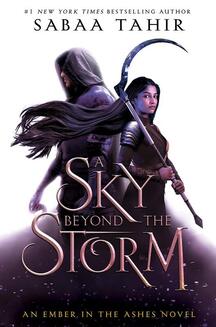 If you read my previous reviews of the other three Ember books, you'll know I wasn't terribly impressed with any of them. Don't get me wrong, they were enjoyable enough and Helene in particular redeemed the other rather infuriating characters in these books enough that I kept coming back. Sky was no different in that regard. This final installment in the series brings events to a head, with Keris and the Nightbringer wreaking havoc across the empire while Laia and her allies struggle to keep up. The jinn, along with the Nightbringer's magic and the sheer numbers of Keris' army make victory all but an impossibility for Laia, Helene, and the handful of secondary characters. As the story marches toward its conclusion, Laia quickly realizes that it's not just the submission of mankind that the Nightbringer desires, but something far worse. (I won't spoil it for you.) On the positive side of things, Tahir's prose doesn't overstay its welcome and she conveys her characters' emotions with skill, even if her dialogue is somewhat stilted. Compared to one or two of the others in this series, the plot of Sky marches on at a satisfyingly brisk pace. However this one, as with the others, fell short for me for a number of reasons. An overuse of prophecy and a generous dose of deus ex machina (among other issues) left me feeling unsatisfied with the way Tahir wrapped this series up. The world we are meant to care so much about feels thin and shallow, with little time spent shaping the nuances that breathe life into villages, cities, and cultures. The Mariners feel indistinguishable from the Martials. The Tribespeople, likely the most distinct of cultures in the books, are given little page time outside of strategy meetings. And the Scholars, who are supposed to be at the heart of this story, seem to have disappeared into the background altogether. Surely all of these peoples are thoroughly fleshed out in the author's mind, but that substance fails to make it to the final publication. Laia is immensely more tolerable in this final installment than she has been previously, but she is still my least favorite character. Honestly, my main problem with her in this book was her approach to trying to bring Elias back from the emotionless shell of the Soul Catcher. Rather than talking about her feelings, or their past together, or literally anything else, she immediately resorts to seduction. Now, I have zero problem with smut in fiction, and the way this book approaches the oft-taboo subject of desire is one of the things I most appreciated in it, but when the two main characters are meant to be a love-match, resorting immediately to sexual baiting just cheapens their bond. Yes, they are physically drawn to each other. There is no shame in that. But this is a battle for Elias' soul between Laia and Mauth. I would have thought she'd dig a little deeper for her weapons. My last big complaint relates to style. I don't mind the rotation of POV, even through a somewhat disorienting four characters. What annoys me is every single chapter ending in a cliffhanger. This leaves the reader waiting several more chapters for the POV to rotate back to find out what happened - except that, by then, your interest has been led elsewhere and you no longer really care what happened to the character in question. This leaves me feeling unattached to the characters, the dangers, and the story itself. Helene is the reason I finished this series, and I leave it behind me now feeling that she was the true hero all along. Her struggle, her devastation, and her titanic endurance rang more authentic than anything else in these books. Her relationship with Harper captured me far more effectively than anything between Laia and Elias, and I can't say anything more on that without spoiling Sky so I'll just leave it at that. This may feel like a scathing review, but I don't mean it to be. I enjoyed this series the same way I enjoy many TV shows: entertaining enough to watch, but won't leave me questioning life's mysteries or feeling moved in any way. Though I'm not likely to read any more of Tahir's work in the future, I was glad to walk in the background with Helene Aquilla for however short a time. 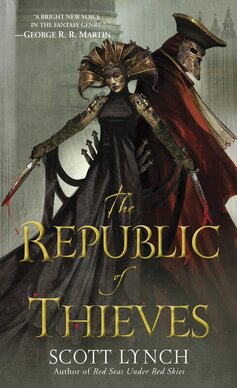 Sadly, this is the last book currently available in this lengthy planned series. I believe there are going to be a total of seven books, so I'll have a good long wait ahead of me. The author suffered a major personal tragedy in the midst of writing these, so I don't blame him for the lengthy hiatus. I'll pick them up when they come out, even if I'm 80. Many people claim this is the weakest of the available books in the Gentleman Bastards series, but I found it quite enjoyable. It didn't have all the flashy battles of Red Seas or the grimdark grit of Lies, but I think this book was more successful than its predecessor in several ways. Republic starts out with Locke on his deathbed, and damn if Lynch didn't hit the nail on the head when it comes to portraying the dynamic between Locke and Jean during such a heart-wrenching situation. You can feel Jean's helplessness and taste Locke's bitter resignation. The two main characters leap off the page for the first several chapters and you can't help but take their struggle personally. Throughout this third installment, Locke and Jean play off one another wonderfully and their bond rings authentic in every scene. Pacing was probably the most notable improvement in Republic. I rarely felt like the story dragged. Even when I wasn't terribly interested in what was happening, the content was still clearly moving the plot forward and thus kept me coming back for more. Despite the book being thick with political intrigue, we still got the occasional breath of fresh air, with Locke and Jean putting their coarser skills to use, intimidating people and wreaking general havoc. There were enough antics to keep me laughing and enough mystery to keep me guessing. Speaking of laughter, the humor in this one is a trove of polished gems. Banter and situational comedy both. Well done, Scott. Romance was set up as a big part of this installment, with the fabled Sabetha finally coming into the picture, but I honestly had a hard time getting into it. While she has her perfectly valid reasons to be stand-offish and suspicious of others' motives, her inability to trust the very people she grew up with makes her infuriating to read. The flashbacks to the group's past were intended to flesh out the long-standing, complicated relationship between Locke and Sabetha, but for me it only served to demonstrate that she is just as emotionally juvenile as she was ten years ago. She still makes the same rash judgements on others. She still gets offended at the drop of a hat. And she still doesn't trust the people who are essentially her only family in the world. Seriously, girl. Get your shit together. Other than that, I didn't really feel the flashback story line was entirely necessary, but I'm guessing it will be important in the later books. I did enjoy seeing Jean get his first taste of manhood, and Calo and Galdo are always a lot of fun to read. I also really liked the ending to this one. Some call it a cliffhanger. Maybe it is. I think it just set readers up nicely for the next book with a bit of ominous teasing. There are some dark clouds on the horizon for Locke, and I look forward to seeing where this story goes. 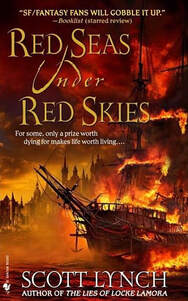 Book #2 in the Gentleman Bastards series started with the same flavor of book #1: two clever, snarky thieves running cons on the rich and powerful. This time, the setting is Tal Verrar, ruled by a triumvirate power structure consisting of the Archon (military dictator), the Priori (a council of the wealthy), and man named Requin (a sort of underworld gambling boss). Locke and Jean are running a long con to get at the latter's substantial horde of wealth, but complications soon arise. The Archon blackmails them into acting as his agents and posing as pirates to stir up rebellion on the Sea of Brass, which would allow the Archon to seize more power in Tal Verrar. Okay, that's a sloppy summary, but honestly the plot isn't entirely necessary for this review. Let's just dig in to the nitty-gritty. First thing's first: Lynch's strengths. The man writes beautiful prose. No doubt about it. Unfortunately for me, I'm not big on Tolkien-esque descriptions of every new location. Lynch has a habit of starting each chapter with a lovely scene-setting paragraph (or three) which, while well-written, I found myself glossing over or skipping entirely. Second, his dialogue remains effortless and uncluttered, which I greatly admire. Third, his characters - the newest batch, in particular - are fleshed out, memorable, and unique without becoming caricatures. Believable, incredibly human characters are what I look for most in a book, and Lynch hits a home run on that front. Reviews of this book are decidedly mixed, and I can understand why. Lynch has some golden moments in Red Seas, but he also stumbles his fair share. The pace of the plot is agonizing for the first half of the book. Once Locke and Jean finally do set out to sea, it picks up and the second half of the book is quite enjoyable. Lynch throws us romantics a bone in this one, with a sweet and understated romance that had me grinning like an idiot. Unfortunately, Scott's also a total asshole who knows how to tear out hearts, put them in blenders, and hit 'frappe'. Seriously, man, I don't think we can be friends after this. It's clear that a lot of research went into this book. I mean, a lot. Red Seas reads like someone who never dabbled in sailing suddenly wanted to write a book entirely about sailing. Which it kinda is. To be fair, the obvious depth of his commitment to accuracy is admirable, but I think he went a little overboard. Much of the detail in the seafaring chapters had the distinct flavor of showing off when just a small amount of technically-accurate banter would have gotten the job done. As a reader, I got fatigued with the jargon after the third such taste (having no experience with sailing, myself) and I ended up just skimming every future instance, of which there were quite a few. The meandering plot and the lack of a much-needed trimming down left me feeling a bit lukewarm about this one, though the closing chapters redeemed it somewhat. I almost DNF'd this book (if you know me, you'll know how incredibly rare that is), but in the end, I'm glad I pushed through. I enjoyed the second half and went ahead and bought book #3 in the series. While Red Seas wasn't a complete disappointment, I have to say that Republic of Thieves will have to be really good for me to want to keep tabs on this still-incomplete series. The next week or so will tell. 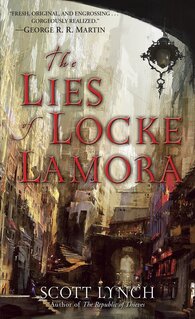 I'd heard a lot of good things about Scott Lynch's Gentleman Bastards series and I was in the mood for something a bit more gritty, so I plucked this one from my TBR stack and dug in. Lies follows the illegal endeavors of one Locke Lamora, a plague orphan who ends up being raised by the most cunning gang boss in Camorr - one who masquerades as a priest. Together with his small crew of con men, Locke robs some of the wealthiest nobles in the city, an act that goes against the sacred truce between Camorr's elite and its underworld, which is ruled by one Capa Barsavi. When a rival Capa moves in to contest Barsavi's rule, Locke's own under-the-radar exploits are upended and the fallout makes for an intense read. Every writer has their own flavor, a sort of attitude that flows from the page. Lynch's is a curious mixture of refinement and vulgarity. His prose is unflinching and yet elegant; his characters intelligent yet unscrupulous. Witty, bawdy banter is set against the dark and dingy backdrop of Camorr, a city ruled by the ruthless, both high-born and low. Lynch doesn't hesitate to use coarse language, which I appreciate. Humans swear. Especially those born in the gutter. It's a reality that often gets censored in traditional publishing, polished away and cleaned up to make manuscripts more palatable for a wider audience. Lies is chock-full of profanity that is used to add humor and authenticity to the story and the characters, and it is done masterfully. The second thing that stood out to me about Lynch's writing was all the things he doesn't say. He doesn't crowd. He leaves lots of room for the reader to imagine or deduce all the missing pieces. He lets his dialogue breathe and he constructs characters effortlessly. Near the beginning, there is a scene with two of the supporting characters, the Sanza twins. They accompany Locke to Barsavi's hideout and while they wait for their audience with the Capa, one Sanza pulls out a deck of cards. The guards in the room immediately tense and the twins protest that the rumors are overblown. What rumors? What happened? Doesn't matter. The mere suggestion adds volumes of depth to the twins' characters in the space of a few lines, and that is exceptional character-building. One part in particular that stood out to me was near the end (don't worry, no spoilers). Locke is out of breath after a flight across the city. As a reader, knowing where he's just come from and the state of mind he's in, I imagine him racing out into the courtyard, cutting the traces on a carriage horse while footmen and guards shout protests, launching himself up onto the horse's back and tearing off into the dark city streets. But all Lynch says is that Locke stole a horse to get there. This struck me at the time, because rarely do I get those moments of spontaneous visualization while reading, especially without any kind of prompting from the text itself. Lynch gives you room to fill in the blanks, and he does so without the prose feeling like it's missing anything. I'll admit, it was hard to get into this book, at first. The first half has so much back-and-forth between the past and the present that I struggled to get engaged. The meetings with the Salvaras (the nobles he's conning) felt tedious. The structure of the chapters is also very nontraditional, but I quickly learned to ignore it and just take the strange numberings as a replacement for scene breaks. Compared to other books, I had to take this one in smaller bites. Lynch's descriptions of Camorr and its history are beautifully-written, but I found myself skimming or just flat-out skipping entire paragraphs. I find those sorts of long-winded explanations exhausting. Perhaps that's why this one took me so long to read. I'm glad I stuck with it, though. This was one of few books that made me actually laugh out loud while reading it. I look forward to the next book in the series. Recommended for more traditional fantasy fans who enjoy darker settings and more elegant prose, as well as a good dose of swearing and shenanigans. |

